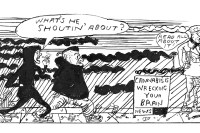
Photo: Max Nash/AFP/Getty Images
Brother Liddle says that Jon Cruddas is the only one of Gordon Brown’s potential successors that gives him any great hope for the future of the Labour party. And given the competition that may not be so very surprising. But if the party conference this week has proved anything, it’s that one of the reasons Brown remains leader is that he is by far and away and for all his faults the most substantial figure in the party.
Still, Labour will, as things stand now, need a new leader next summer. That, actually, is the lesser of the party’s two major problems. Before it decides what sort of leader it wants, Labour needs to decide what sort of party it wants to be. That, however, is a discussion that takes time and demands a period of quiet reflection.
Defeated parties tend to look to the “next generation” when it comes to choosing a successor to the defeated incumbent. That’s a natural and understandable reaction to defeat. But it may not always be the wisest course. In retrospect the Tories might have fared better if John Major had remained leader for the first year of the Blair ministry; certainly William Hague became leader too soon and the party, in retrospect, erred by granting him that responsibility before he, or it, was really ready for a generational change.
So, if one accepts this premise, whom should Labour choose? Since it’s hard to imagine Brownhaving any desire to be leader of the opposition and since Harriet Harman would surely be a disastrously divisive choice and since none of the Younger Guns – the Milibands, Balls and Purnell – quite seem ready for the task, that leaves a brace of experienced chaps who might be best placed to hold things together while the party licks its wounds and comes to terms with life in opposition.
Jack Straw is one such fellow and his leadership credentials – in all their feeble glory – have been examined enough already. But what about Alistair Darling? Rather quietly, the Chancellor has had a good year. Or, rather, by the standards of the current Cabinet he’s had a good year. The blame for the country’s fiscal predicament rests with the Prime Minister, not the Chancellor and Darling may have done enough to put some distance between the Treasury and his long-time sponsor.
Now, sure, Darling isn’t a perfect candidate. But if such existed we wouldn’t be having this discussion. But he has a certain calmness about him that might, just might, be what Labour need. Because, assuming Cameron becomes Prime Minister, the public will not, I think, be interested in hearing very much from Labour for quite some time. It will not be a moment for the new Labour leader to make a name for himself. Rather, it will be a time for the party to offer constructive criticism – particularly on tax and spending and fiscal policy – while it concurrently has its internal debate.
Darling might be able to do that. More than any other member of the cabinet he must appreciate the gravity of the financial dilemmas that will afflict the next Prime Minister. More than any other would-be Labour leader he’d be able to offer a degree of steadyness. Knee-jerk oppositionalism will be neither popular nor welcome. Darling’s calmness – hitherto condiered dullness – might just be what the party needs.
Not for the long-term, of course, but perhaps for a couple of years. Darling, then, might be the caretaker Labour needs while they consider their next move and the kind of party they want to be. Not exciting, by any means, but steady, restrained competence might be what Labour need more than anything else.
Perhaps he has no leadership desires. So much the better. Perhaps too, this is nonsense, but it may also be true that Labour could do worse that choose the quiet Edinburgh badger to lead them through the difficult, choppy times that lie ahead. Just a thought…






Comments